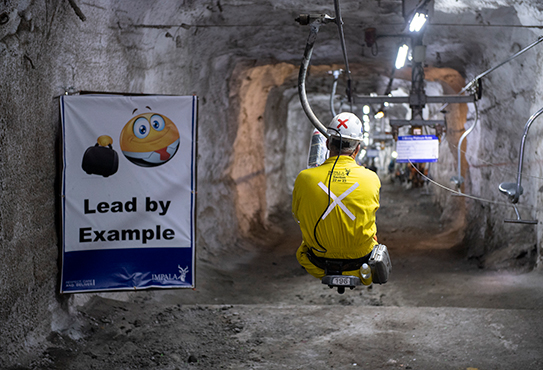- Home
- Careers
- Working at Implats

Living the Implats Way
Our purpose is to create a better future. We accomplish this through the metals we produce, the way we do business and through our superior performance.
Read moreSouth Africa 0800 005 314
Zimbabwe 0772 161 630
Impala Canada 1-866-921-6714 (toll free) or email the operation at email address:
Impalacanada@integritycounts.ca to lodge complaints or grievances.
For more information on how we handle reports and protect whistleblowers, please review our Fraud, Corruption and Whistleblowing policy
We aim to align our employees' personal goals and aspirations with the objectives and deliverables of our business.

Mining engineering as a career combines several areas of expertise. In addition to specialist mining knowledge and engineering expertise, a mining engineer needs strong management skills, people skills, and a sound understanding of financial and business principles.
Every day we use hundreds of products which are made from metal. The metallurgist/chemical engineer's job is to produce the metals needed to make these and the many other products we need. In carrying out this task, science, chemistry, mathematics and physics are combined with engineering principles to extract the metals from the ores in which they are found so that they can be refined and produced in the right form.
Geology is the study of the earth's crust and its rock formations, and includes classifying and mapping of the composition and distribution of mineral deposits contained in the earth's formations. In the mining industry, this knowledge is applied to find additional mineral resources and to upgrade existing resources.
Geologists operate in wide areas. Two of these, mining geology and exploration geology, are vital to the mining industry.
No mine can operate without electricity. The provision of power and the maintenance of equipment and machinery is the responsibility of the engineering department whose main aim is to ensure that the technical support necessary to meet production targets is provided to the mining and metallurgical departments.
The main objective of the finance department is to control, gather, analyse and interpret financial information in such a way that internal and external stakeholders, such as management, investors, banks and shareholders, can use it to forecast the future of the company to make decisions based on historic information.

Graduates
Learnerships
For more information contact graduatesrecruitment@implats.co.za

Applications for bursaries are open to all matric candidates who meet the minimum criteria:
Our bursaries cover:
Should you be awarded an Implats bursary, you will be required to work for the company for the full period of the bursary and to undertake vacation work at the company at the end of each year. Implats offers bursaries in various fields:
How to apply for a bursary
If you meet the minimum criteria and you would like to apply for a bursary, please fill in the application form.
BURSARY APPLICATION FORM [PDF 53KB]
For more information contact Bursaries Department on +27 14 569 0088 or bursaries@implats.co.za.